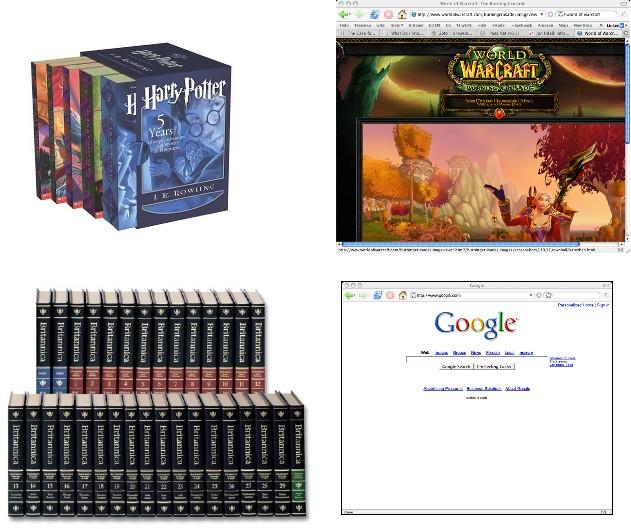In a number of my recent talks on publishing, such as at The Buying and Selling eContent conference I spoke at last week, I’ve focused on asymmetric competition, the fact that publishers aren’t just competing with other publishers, but with other types of services that do the same job.
I start this section of my talk with a couple of examples:
Harry Potter and World of Warcraft both do the job of creating an imaginative world into which people can escape (and perhaps even find themselves); Brittanica and Google both provide access to a comprehensive source of information. Harry Potter has far more in common with WoW than it does with Brittanica, and Brittanica has far more in common with Google (or Wikipedia) than it does with Harry Potter.
The failure to think about what job your product does for the customer, rather than the tools or approach you’ve historically used to do that job, is the reason why many established companies fail to make the transition when there is a technological change. Hence the old saw, “If the railroads had realized they were transportation companies, they’d be airlines today.” (Well, maybe yesterday, as the airlines are suffering their own business transition. Maybe they’d be Fedex/Kinko’s today. Or Google/Skype.)
At O’Reilly, we think a lot about the job we do. Our core mission is “Changing the world by spreading the knowledge of innovators,” and that’s why we publish both in print and online, do face to face conferences, and practice technology activism.
Our products themselves do three primary jobs: teaching, reference, and entertainment. A book like Head First Java or an online course from Learning Labs is primarily a teaching tool; a book like Java in a Nutshell is primarily for reference; a book like HTML: The Definitive Guide might do a mix of teaching and reference; and books like our popular Hacks series or Make: magazine offer a mix of tutorial and entertainment.
When you think about it this way, the competitive landscape appears very different. Reference books are challenged more by Google (and in fact, sales of reference books have declined the most in recent years, while more tutorial books like the Head First series or entertainment-infused books like the Hacks series and Make: now represent the bulk of our bestsellers.)

